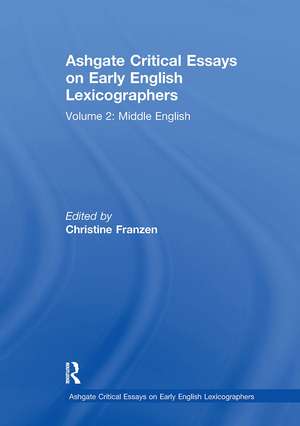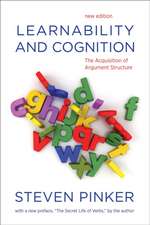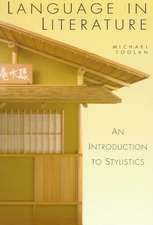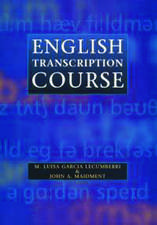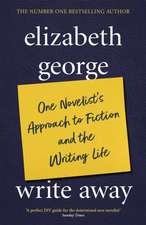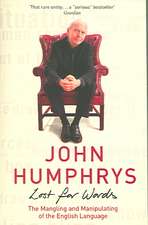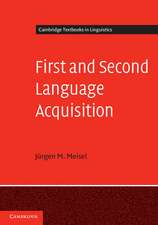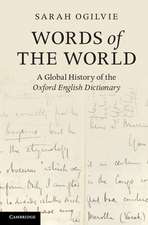Ashgate Critical Essays on Early English Lexicographers: Volume 2: Middle English: Ashgate Critical Essays on Early English Lexicographers
Editat de Christine Franzenen Limba Engleză Paperback – 14 oct 2024
| Toate formatele și edițiile | Preț | Express |
|---|---|---|
| Paperback (2) | 228.56 lei 6-8 săpt. | |
| Taylor & Francis – 14 oct 2024 | 228.56 lei 6-8 săpt. | |
| Taylor & Francis – 14 oct 2024 | 234.63 lei 6-8 săpt. | |
| Hardback (2) | 1698.25 lei 6-8 săpt. | |
| Taylor & Francis – 14 dec 2012 | 1698.25 lei 6-8 săpt. | |
| Taylor & Francis – 14 dec 2012 | 1704.35 lei 6-8 săpt. |
Preț: 228.56 lei
Preț vechi: 265.17 lei
-14% Nou
Puncte Express: 343
Preț estimativ în valută:
43.73€ • 45.79$ • 36.19£
43.73€ • 45.79$ • 36.19£
Carte tipărită la comandă
Livrare economică 05-19 aprilie
Preluare comenzi: 021 569.72.76
Specificații
ISBN-13: 9781032918471
ISBN-10: 1032918470
Pagini: 578
Dimensiuni: 174 x 246 mm
Greutate: 1.07 kg
Ediția:1
Editura: Taylor & Francis
Colecția Routledge
Seria Ashgate Critical Essays on Early English Lexicographers
Locul publicării:Oxford, United Kingdom
ISBN-10: 1032918470
Pagini: 578
Dimensiuni: 174 x 246 mm
Greutate: 1.07 kg
Ediția:1
Editura: Taylor & Francis
Colecția Routledge
Seria Ashgate Critical Essays on Early English Lexicographers
Locul publicării:Oxford, United Kingdom
Public țintă
AcademicCuprins
Contents: Introduction; Section 1 Looking Back to Old English: The Old English gloss of the Eadwine Psalter, Phillip Pulsiano; The Hatton MS of the West Saxon Gospels: the preservation and transmission of Old English, Andreas Fischer; Building a glossary: extract from 'Use of Sources and External Aids', Christine Franzen; An early 'hard word' list: Stephen Batman's 'A Note of Saxon Wordes', John R. McNair; Stephen Batman and the Expositio vocabulorum, Carl T. Berkhout; Expositio Vocabulorum: a medieval English glossary as archival aid, Don C. Skemer. Section 2 Latin Lexicographers, their Methods and Works, 11th-13th Centuries: Lexicography in the Middle Ages, Olga Weijers; From Ælfric to John of Cornwall: evidence for vernacular grammar teaching in pre- and post-Conquest England, Lucia Kornexl; The Oratio de utensilibus ad domum regendam pertinentibus by Adam of Balsham, Patrizia Lendinara. Section 3 Other Latin Texts and Glossaries with Anglo-Norman and English Glosses, Mainly 12th and 13th Centuries: A polyglot glossary of the 12th century, David Howlett; English plant names in the 13th century: the trilingual Harley vocabulary, Hans Sauer. Section 4 Anglo-Norman and the Trilingual Society, from the 13th Century: Anglo-Norman: past and future, Tony Hunt; Anglo-French and Middle English vocabulary in Femina Nova, W. Rothwell; The trilingual England of Geoffrey Chaucer, W. Rothwell; Business training in medieval Oxford, H.G. Richardson; A French vocabulary and conversation-guide in a 15th-century legal notebook, J.H. Baker. Section 5 Latin and English, 14th and 15th Centuries: Book production terms in Nicholas Munshull's Nominale, Jeremy Griffiths; The teaching of Latin in later medieval England, Brother Bonaventure; The recovery of a 15th-century schoolmaster's book: Beinecke MS 3 No. 34, Linda Ehrsam Voigts and Barbara A. Shailor; Late 15th-century 'terms of association' in MS Pepys 1047, T.L. Burton; Cambridge University Library L1 1 14, f.46 r-v: a late medieval natural scientist at work, D. Thomas Benediktson; The Preface to a Fifteenth-Century Concordance, Sherman M. Kuhn. Section 6 The 15th-Century Alphabetical Dictionaries: Humfrey Wanley borrows books in Cambridge, Helmet Gneuss; The Catholicon Anglicum (1483): a reconsideration, Gabriele Stein; Linguistic problems with the tradition of the 15th-century glossary Medulla grammatice, Vincent P. McCarren; Conclusion; Index.
Notă biografică
Christine Franzen was formerly at the School of English, Film and Theatre with Media Studies, Victoria University of Wellington, New Zealand.
Descriere
The teaching of Latin remained important after the Conquest but Anglo-Norman now became a language of instruction and, from the thirteenth century onwards, a language to be learned. During this period English lexicographers were more numerous, more identifiable and their works more varied. The material discussed ranges from a twelfth-century glossa
